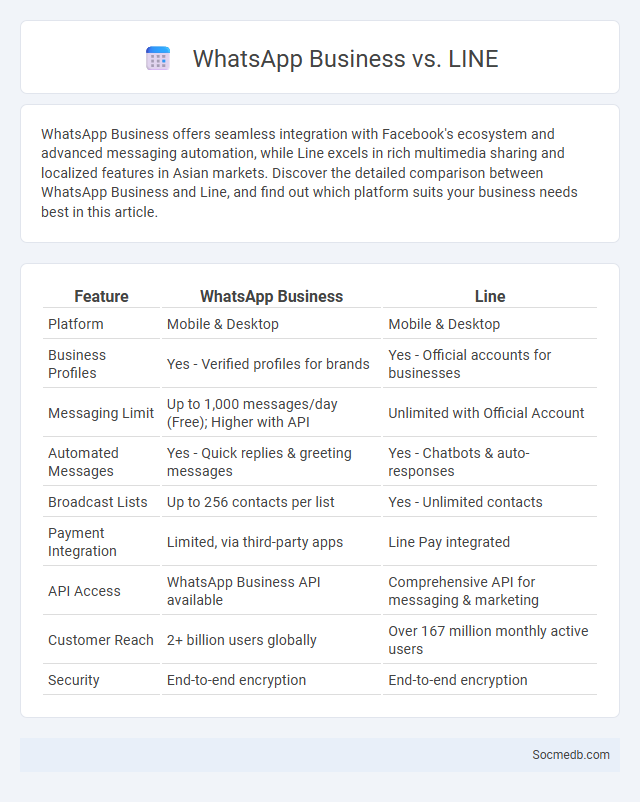
Photo illustration: WhatsApp Business vs Line
WhatsApp Business offers seamless integration with Facebook's ecosystem and advanced messaging automation, while Line excels in rich multimedia sharing and localized features in Asian markets. Discover the detailed comparison between WhatsApp Business and Line, and find out which platform suits your business needs best in this article.
Table of Comparison
| Feature | WhatsApp Business | Line |
|---|---|---|
| Platform | Mobile & Desktop | Mobile & Desktop |
| Business Profiles | Yes - Verified profiles for brands | Yes - Official accounts for businesses |
| Messaging Limit | Up to 1,000 messages/day (Free); Higher with API | Unlimited with Official Account |
| Automated Messages | Yes - Quick replies & greeting messages | Yes - Chatbots & auto-responses |
| Broadcast Lists | Up to 256 contacts per list | Yes - Unlimited contacts |
| Payment Integration | Limited, via third-party apps | Line Pay integrated |
| API Access | WhatsApp Business API available | Comprehensive API for messaging & marketing |
| Customer Reach | 2+ billion users globally | Over 167 million monthly active users |
| Security | End-to-end encryption | End-to-end encryption |
Introduction to Messaging Apps for Business
Messaging apps like WhatsApp, Facebook Messenger, and Slack have transformed how businesses communicate, offering real-time interaction with customers and streamlined team collaboration. Your company can leverage these platforms to enhance customer service, increase engagement, and boost sales through personalized, instant messaging. Integrating messaging apps into your marketing strategy ensures faster response times and builds stronger relationships with your audience.
Overview of WhatsApp Business
WhatsApp Business enables Your company to connect with customers through a dedicated platform designed for small and medium enterprises. It offers features like automated messages, quick replies, and business profiles to enhance customer engagement and streamline communication. With over 2 billion users globally, WhatsApp Business facilitates efficient customer service and marketing in a highly accessible messaging environment.
Overview of LINE for Business
LINE for Business offers a robust platform integrating messaging, advertising, and e-commerce solutions tailored for brands and entrepreneurs. With over 200 million monthly active users across Asia, LINE enables targeted marketing through features like LINE Official Accounts, rich menus, and chatbots. The platform supports seamless customer engagement and data-driven strategies, enhancing brand visibility and conversion rates in competitive digital markets.
What Is a Business Account?
A business account on social media platforms provides specialized tools designed to help you grow your brand through analytics, targeted advertising, and enhanced profile customization. This type of account enables access to insights on audience demographics and engagement metrics, allowing more effective content strategies. Managing your business presence with a professional account improves customer interaction and drives sales by leveraging platform-specific features tailored for commercial use.
Key Features Comparison
Social media platforms differ in key features such as user demographics, content formats, and engagement tools, which directly impact your marketing strategy. Facebook excels in community building with robust group functionalities, Instagram focuses on visual storytelling through photos and short videos, while Twitter prioritizes real-time updates and concise text posts. TikTok's algorithm-driven feed and creative video editing tools offer unique opportunities for viral content, making it essential to choose platforms aligned with your target audience and content style.
Pricing and Subscription Models
Social media platforms commonly offer a range of pricing and subscription models, including freemium options with basic features available for free and premium plans that unlock advanced functionalities, ad-free experiences, or exclusive content. Subscription tiers often vary by monthly or annual fees, catering to individual users, businesses, and influencers seeking enhanced analytics, content promotion, or collaboration tools. Custom enterprise solutions with scalable pricing are also prevalent, providing tailored support and integration for large organizations aiming to maximize engagement and ROI.
User Base and Market Reach
Social media platforms collectively host over 4.7 billion active users worldwide, driving unprecedented global connectivity and engagement. Facebook remains the largest network with approximately 3 billion monthly active users, while Instagram and TikTok continue their rapid growth among younger demographics. Expanding market reach through targeted advertising and algorithm-driven content delivery enables brands to access diverse audiences across multiple regions effectively.
Security and Privacy Considerations
Protecting your personal data on social media platforms is crucial due to frequent data breaches and unauthorized third-party access. Implement strong, unique passwords and enable two-factor authentication to safeguard your accounts from cyber threats. Regularly review privacy settings to control who can view your content and limit data sharing with advertisers or external apps.
Integration with Business Tools
Social media platforms offer robust integration capabilities with business tools such as CRM systems, marketing automation software, and analytics platforms, enabling seamless data synchronization and enhanced customer engagement. By linking social media channels with tools like Salesforce, HubSpot, or Google Analytics, businesses can track campaign performance, automate customer interactions, and generate actionable insights. This integration streamlines workflows, improves decision-making processes, and drives ROI by leveraging real-time user data and targeted content delivery.
Which Platform Is Best for Your Business?
Choosing the best social media platform for your business depends on your target audience, industry, and marketing goals. Facebook excels for broad audience reach and detailed targeting, while Instagram is ideal for visually-driven brands targeting younger demographics. LinkedIn offers powerful B2B networking and lead generation opportunities, making it essential for professional services.
 socmedb.com
socmedb.com